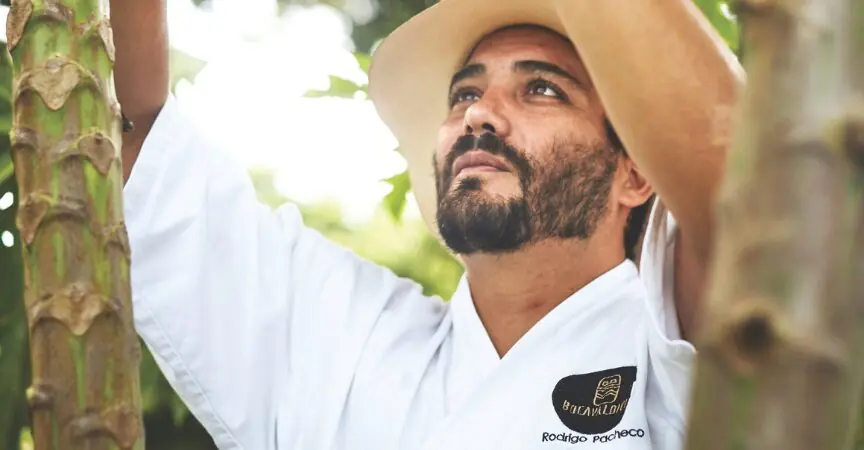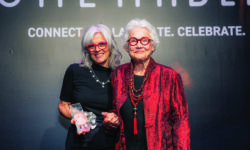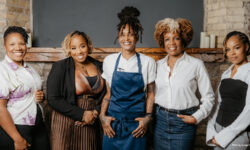Chef Rodrigo Pacheco on Nature, Sustainability & the Evolution of Gastronomy
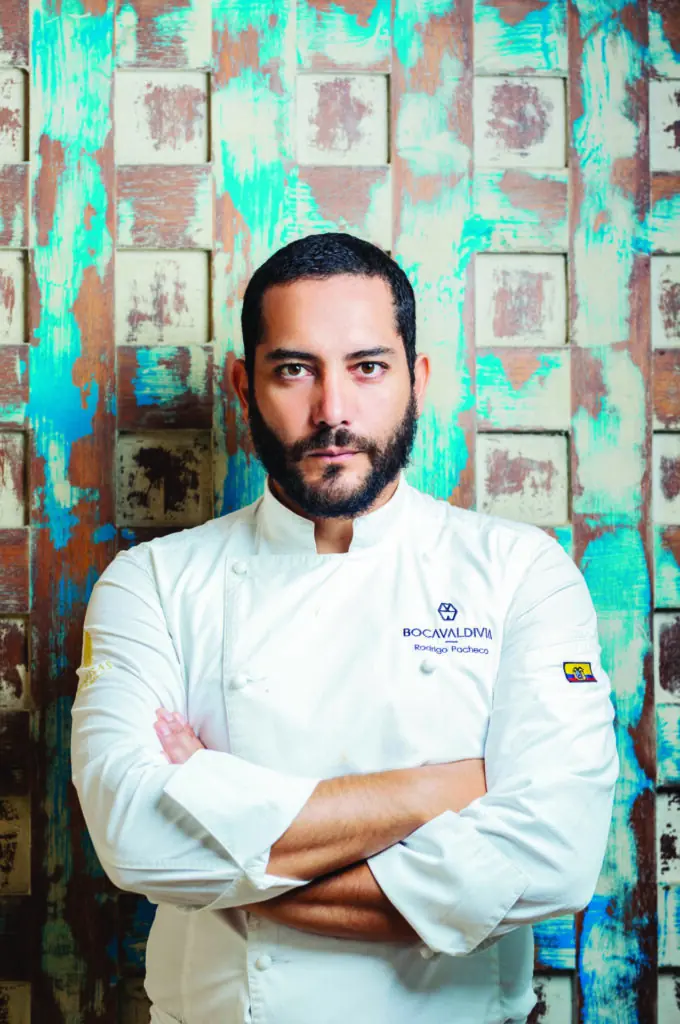
Chef Rodrigo Pacheco is not just a culinary artist—he is a pioneering force who has intertwined high-level gastronomy with environmental conservation, community empowerment, and the revival of Indigenous foodways. Based in Ecuador, one of the world’s most biodiverse countries, Chef Rodrigo’s work reminds us that gastronomy is not just a craft, but a way to connect with nature, preserve ecosystems, and build a more sustainable future.
Tucked away on the remote coast of Ecuador, his restaurant, Bocavaldivia, was designed to feel like a living organism, harmoniously intertwined with the land around it. The restaurant’s walls are a blend of raw wood and open air, seamlessly blending the indoors with the lush surroundings of reforested wilderness. Here, Chef Rodrigo Pacheco has cultivated not just a dining experience but an ecosystem, where Indigenous crops thrive alongside a rich biodiversity of wild plants and local wildlife. The menu reads like an ode to the land, with every dish sourced from the forest or the nearby ocean—fish caught by hand, herbs foraged just hours before plating, vegetables pulled straight from the soil. Guests dine beneath the canopy, their meals arriving as stories, not only of culinary mastery but of the cycles of nature itself. Pacheco’s kitchen is a testament to a new kind of luxury—that reveres what the earth makes available, transformed into art.
Chef Rodrigo’s deep respect for nature and commitment to sustainable practices have earned him a role as a United Nations Food and Agriculture Organization (FAO) Goodwill Ambassador, where he advocates for sustainable food systems globally. As the food industry looks to the future, Pacheco’s vision offers a compelling roadmap for how chefs can lead the charge toward sustainability and environmental stewardship, rooted in the transformative power of food and respect for the land and its people.
MENU: Chef Rodrigo, your career blends fine dining with environmental activism. How did your journey as a chef lead you to where you are now?
Chef Rodrigo Pacheco: Thank you for the opportunity to share my journey. I’ve always felt that my career is more than just cooking—it’s a life mission. I was connected to nature from a very young age. Whether I was hiking in the forests or observing wildlife, I saw the world around me as an intricate system, a
cycle of life. I was fascinated by how everything in nature worked in harmony, and I wanted to be a part of that.
In my home, the kitchen was the heart of the house. My mother and grandmother were amazing cooks, and they taught me that food is not just about nourishment—it’s about relationships, culture and memory. These experiences shaped how I think about food today. As I grew older, I wanted to combine my passion for gastronomy with my respect for nature. I trained in France under chefs like Paul Bocuse and Michel Bras, and while I learned a lot about discipline, precision and technique, I realized that my culinary journey had to be more than just creating beautiful dishes. It had to be a way to honour the land, the environment, and the culture of my home in Ecuador.
MENU: Bocavaldivia is as much about sustainability as it is about gastronomy. Can you tell us more about how you developed the restaurant, and what role sustainability plays in your work?
RP: Developing Bocavaldivia has been an extraordinary journey. The restaurant didn’t start with a kitchen—it started with the land. I wanted to create something that was truly sustainable, where the restaurant and the ecosystem worked together. Before we built the kitchen, we planted a forest. We began by reforesting the land and planting Indigenous crops, restoring the biodiversity that had been lost over time.
In the beginning, it was extremely challenging because we had no suppliers. We couldn’t rely on external sources for ingredients, so we had to fish for our seafood, forage for wild plants, and grow all of our vegetables and herbs ourselves. There were times when it felt like an impossible task, but that necessity forced us to become more creative and resourceful. Over time, the land began to give back.
The forest we planted became a thriving ecosystem, and now it provides many of the ingredients we use in our dishes.
Sustainability is not just about sourcing ingredients locally; it’s about building a system that regenerates itself. Everything we do at Bocavaldivia is designed to minimize waste and reduce our impact on the environment. We compost all of our organic waste, and we recycle water to nourish our crops.
It’s a closed-loop system where nothing goes to waste. Our goal is to create a restaurant that exists in harmony with the land, and we’re constantly learning from nature how to improve that balance.
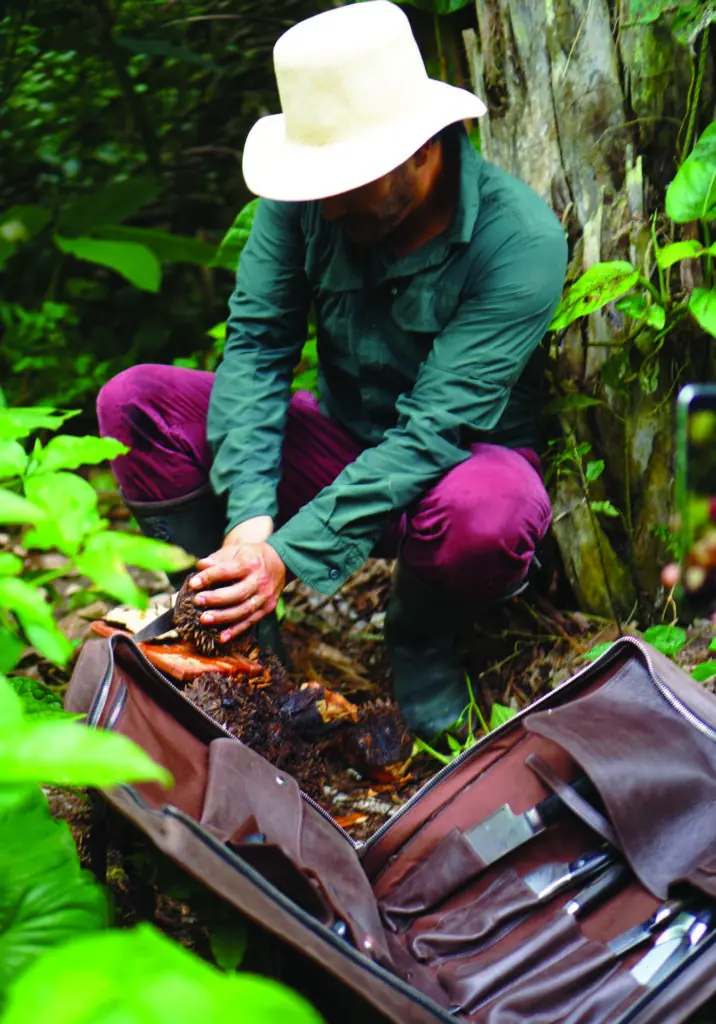
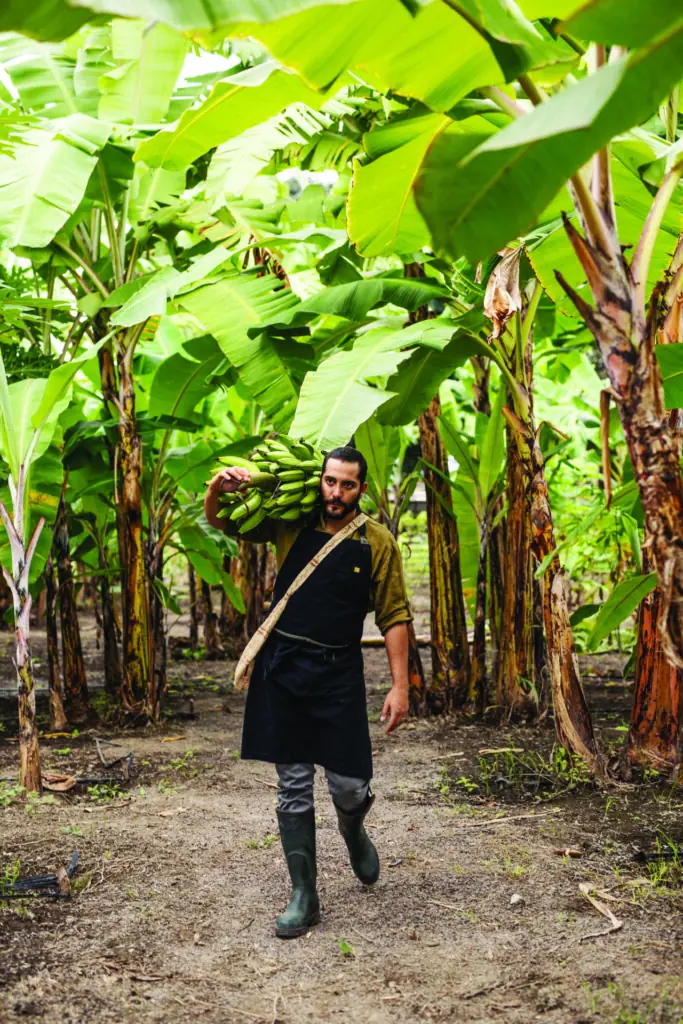
MENU: Your team is an essential part of the restaurant’s operation. Can you tell us more about how your team works with the land and the role they play in Bocavaldivia’s sustainability practices?
RP: Absolutely. The team at Bocavaldivia is integral to the success of the restaurant, and their role extends far beyond the kitchen. Many of the people who work with me come from the local Indigenous communities, and some had no formal culinary training when they first started. I’ve spent over a decade training them, not just in cooking techniques but in the philosophy of sustainability and respect for the land. This process has been incredibly rewarding, and we’ve learned from each other along the way.
One of the unique things about Bocavaldivia is that everyone on the team is involved in managing the land and working the forest. For example, when it’s time to harvest crops, the entire team—whether they’re in the kitchen or the front of house—goes out to work the land together. We grow many of our own ingredients, from vegetables to cacao, and the team is involved in every step of the process, from planting and harvesting to processing the ingredients.
We also go fishing together. We use traditional fishing methods, like casting nets along the shoreline, which is physically demanding work. The ocean can be unpredictable, and sometimes it takes hours to catch enough fish. But the effort is worth it because it keeps us connected to the land and the sea. When we serve a dish, we know exactly where the ingredients came from and the work that went into sourcing them. This connection to the process is what makes our food special. We’re not just cooking—we’re part of the entire lifecycle of the ingredients.
I always say that the machete is the first knife that every chef should learn to use. Before you start cutting vegetables in the kitchen, you need to understand where they come from. The machete is used to clear the land, to harvest crops, and to understand the rhythm of nature. The land teaches us that everything has its cycle—the plants, the fish, the animals—and that knowledge is essential to creating food that is in harmony with the environment.
MENU: You’ve emphasized working with Indigenous ingredients and communities. What advice would you give to chefs who want to incorporate Indigenous foodways into their cuisine?
RP: It’s absolutely worth the effort, but it requires a lot of respect and dedication. When I first returned to Ecuador after training in France, I thought I knew a lot. I had absorbed so much knowledge from the
European culinary world, but I quickly realized that Ecuador had its own culinary heritage that was deeply connected to the land and Indigenous cultures. I had to unlearn many things and immerse myself in nature and the local communities to truly understand the ingredients.
Incorporating Indigenous ingredients is not about seeking out exotic or rare products— it’s about understanding the stories, traditions and ecosystems behind them. You have to connect with the people who have been growing and using these ingredients for generations. For example, at Bocavaldivia, we’ve worked hard to revive forgotten plants, fruits and herbs that were once central to the local diet but had fallen out of use over time. Bringing these ingredients back into our dishes gives them a deeper sense of place and history.
One of the biggest lessons I’ve learned is that necessity breeds creativity. When you don’t have access to modern conveniences or a wide array of imported ingredients, you’re forced to look to nature for solutions. The Indigenous knowledge of the land has been key to our success. Chefs who want to work with Indigenous foodways need to be willing to spend time in the field, connect with the people who grow the ingredients, and learn from their wisdom.
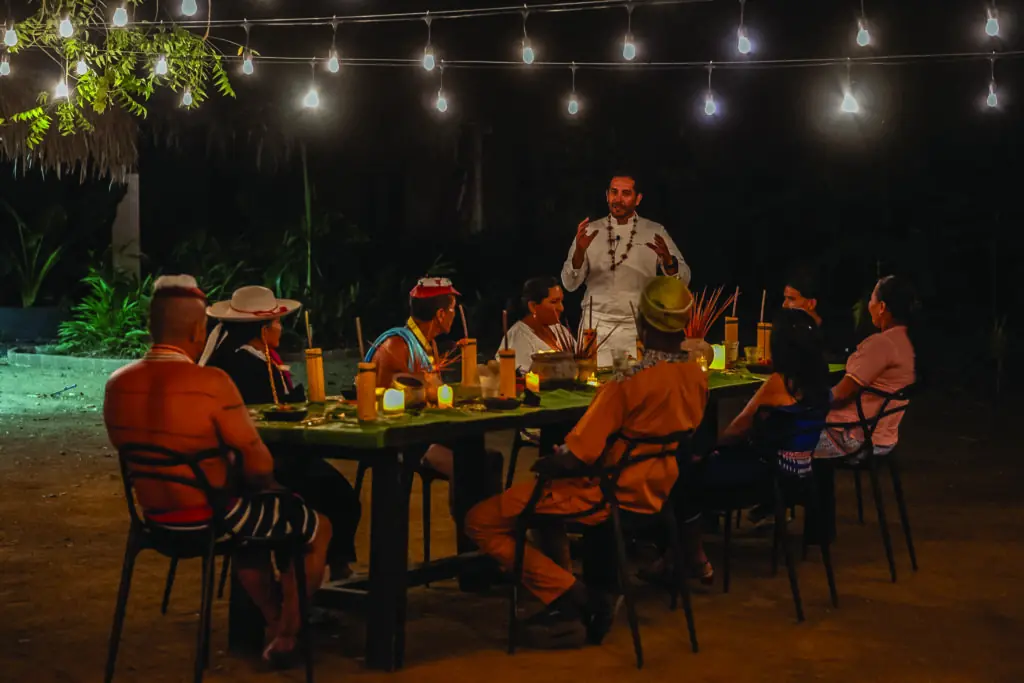
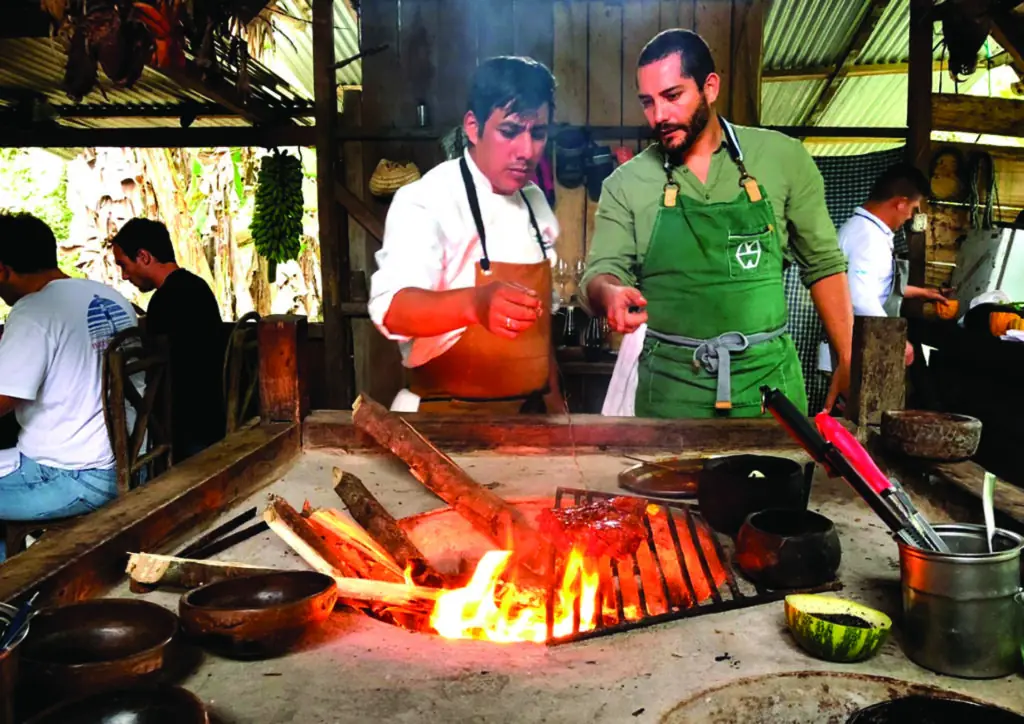
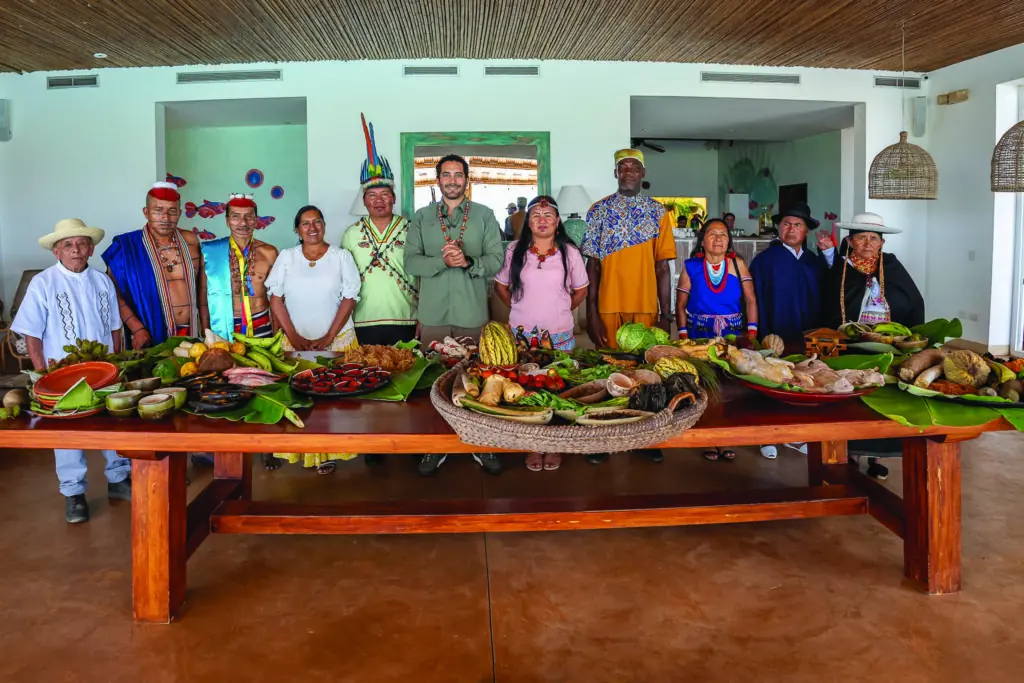
MENU: You’ve spent time in Canada and have worked with Indigenous communities here as well. What’s your impression of the Canadian restaurant scene, particularly when it comes to sustainability?
RP: Canada is a fascinating country with so much potential in terms of sustainability and Indigenous cuisine. I’ve had the privilege of spending time in different parts of Canada, including living with the Cree community in Hudson Bay when I was younger. That experience left a deep impression on me. I participated in their rituals, went fishing with them, and learned a lot about their food culture and respect for the land.
What I see in Canada is a diverse food culture with a wealth of ingredients, but I think there’s still work to be done in terms of sustainability. It’s easy to import products from all over the world, but I believe the future of Canadian gastronomy lies in building a sustainable ecosystem that reflects the local environment and honours Indigenous foodways.
Canada’s greatest strength is its Indigenous cultures, which have deep-rooted connections to the land. These foodways have sustained communities for thousands of years, and I believe they are the foundation of what Canadian cuisine could become.
MENU: You’ve been an United Nations Food and Agriculture Organization (FAO) Goodwill Ambassador for five years now. Can you tell us more about your work with the UN and your recent projects like The First Table?
RP: It has been an honour to serve as a FAO Goodwill Ambassador. My role is to raise awareness about sustainability and biodiversity through gastronomy. One of the projects I’m most proud of is The First Table, a series of mini documentaries that focus on Indigenous foodways. The idea behind The First Table is to bring Indigenous communities to the global stage by showcasing their ingredients,
traditions, and stories.
In the first episode, I invited eight Indigenous cultures from different regions of Ecuador—each from a distinct ecosystem, like the Highlands, the Amazon, and the coast. They brought ingredients that were native to their regions, and we cooked together. It was the most meaningful meal I’ve ever prepared, even though I’ve cooked for Michelin-starred chefs, presidents and Hollywood stars. Serving these Indigenous brothers and sisters, and sharing their traditions, was an incredibly humbling experience.
I’m excited to bring The First Table to Canada. There are so many unique Indigenous cultures in Canada, each with its own foodways, and I believe we can use gastronomy to honour and elevate their traditions. By sharing these stories, we can create a deeper understanding of how food connects us to the land and to each other.
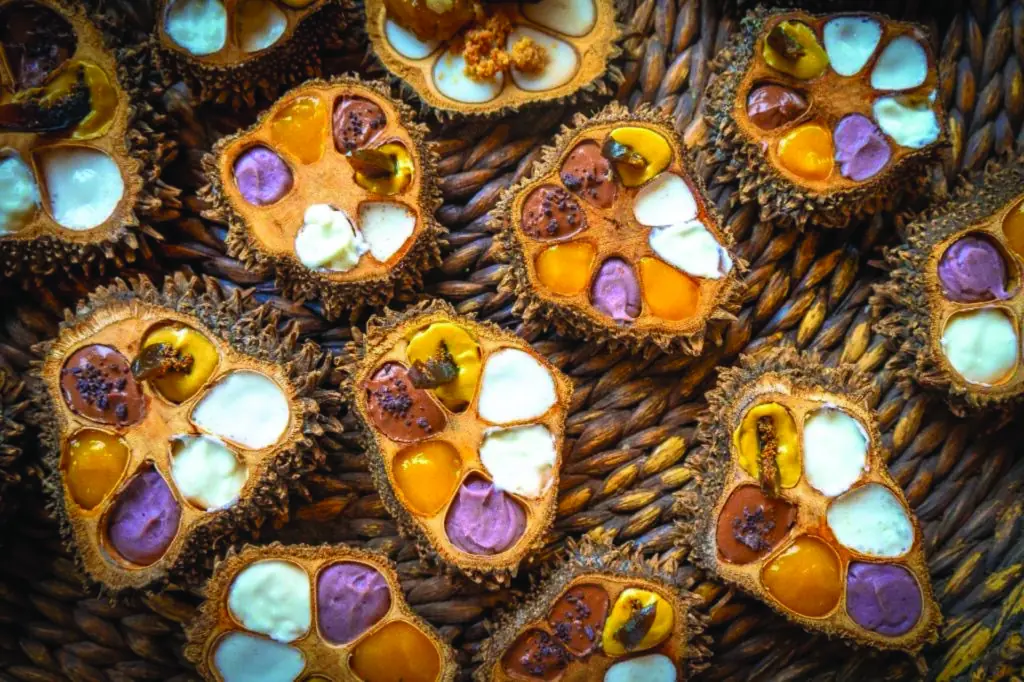
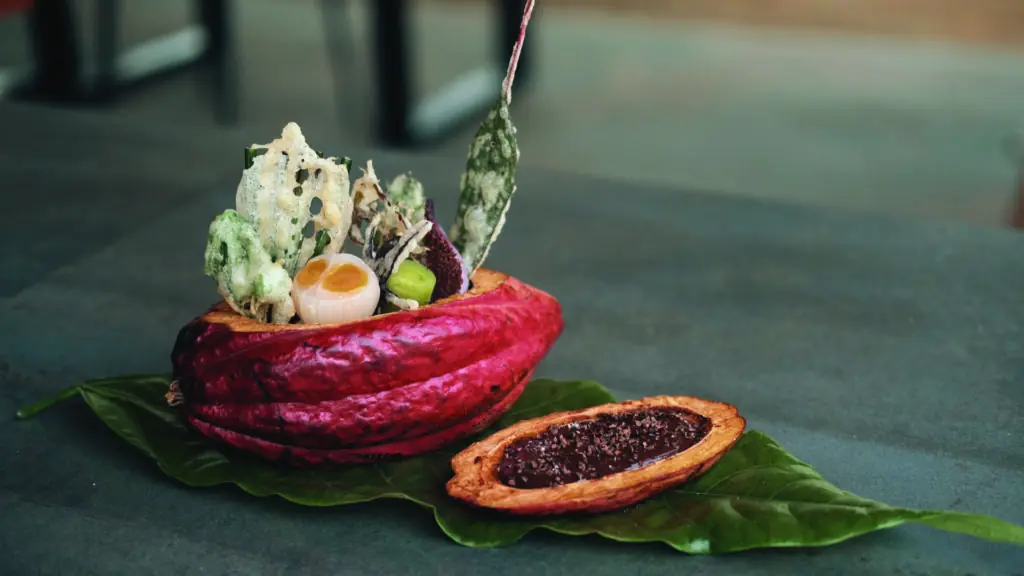
MENU: Finally, what do you see as the future of gastronomy, particularly when it comes to sustainability and environmental transformation?
RP: The future of gastronomy is deeply connected to sustainability. Cooking can no longer just be about creating beautiful dishes—it has to serve a greater purpose. Chefs have the power to influence how people think about food and the environment, and we have a responsibility to use that influence for good.
For me, the true measure of a restaurant’s success isn’t how many Michelin stars it has—it’s how many hectares of land it’s protecting. At Bocavaldivia, we’re not just focused on creating great food; we’re working to conserve the land, restore biodiversity, and support our community. Gastronomy should be a tool for environmental restoration, protecting ecosystems, and nurturing local communities.
Chefs have a unique opportunity to lead the way in environmental transformation. By sourcing ingredients sustainably, reducing waste, and educating their customers, we can make a real impact. As more chefs embrace this responsibility, I believe we’ll see gastronomy evolve into a powerful force for positive change in the world.
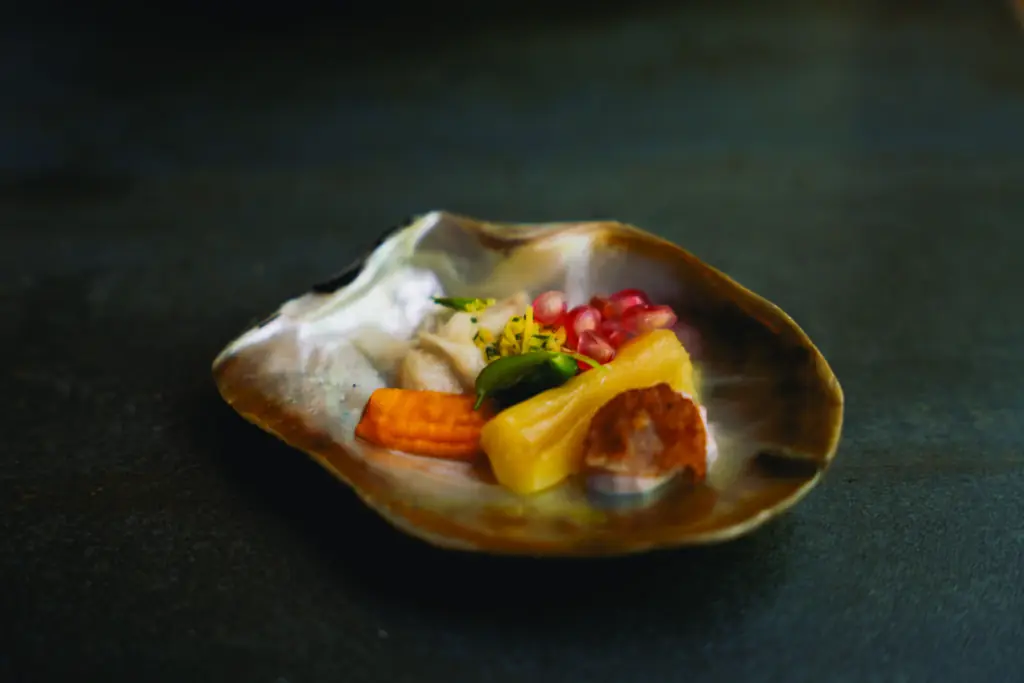
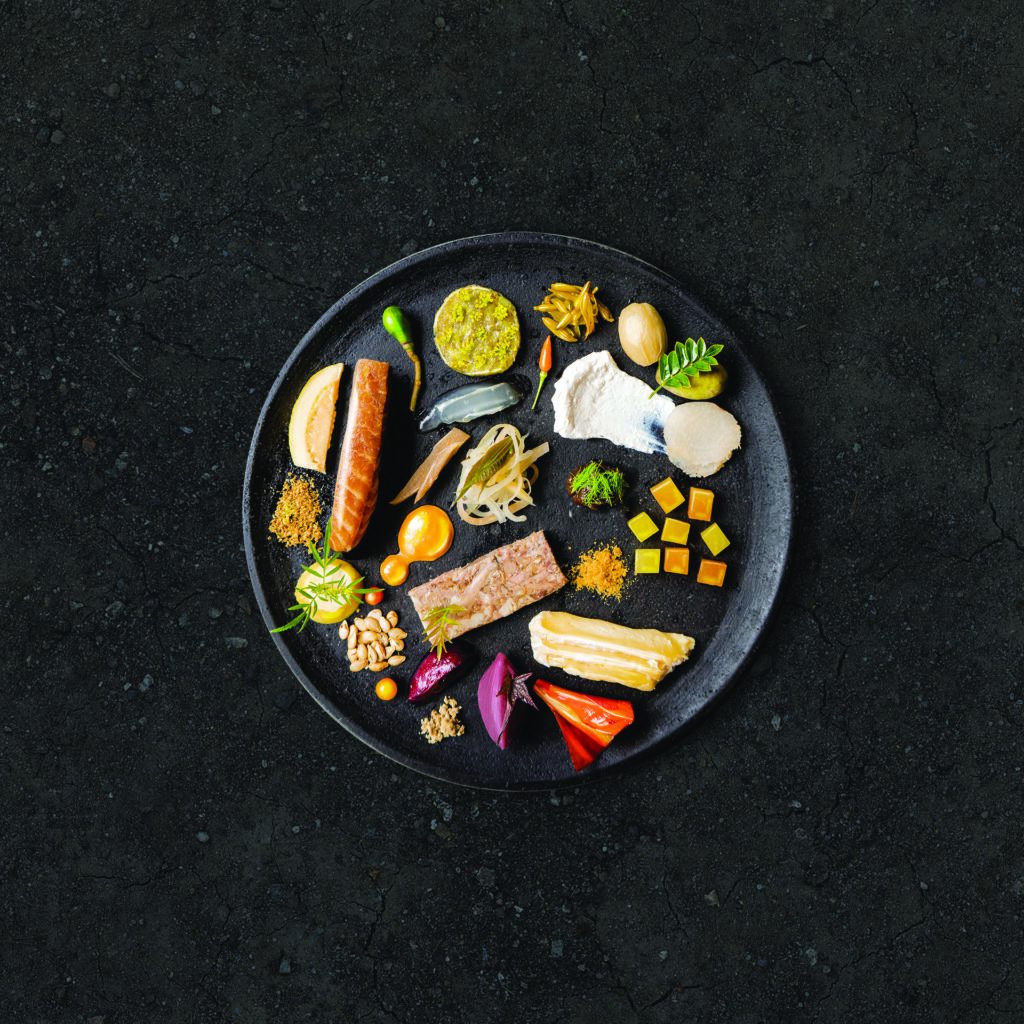
About Chef Rodrigo
Rodrigo Pacheco is an Ecuadorian chef, who fulfills the diplomatic role as Goodwill Ambassador in Ecuador, at the Food and Agriculture Organization of the United Nations. He attracted the attention
of the world through his culinary art and his innovative project “The largest Biodiverse Edible Forest
in the world” that he develops as Executive Director of the Bocavaldivia Foundation, to address
socio-environmental causes, through a mechanism for ecosystems conservation, reconection, restoration and strengthening, catalyzed by gastronomy. He is founder of Bocavaldivia research and development restaurant, located in Puerto Cayo, Manabí and founder of Foresta restaurant located in Quito, capital of Ecuador. His vision, career and purpose plus his extraordinary participation in the gastronomic competition “The Final Table” produced by Netflix, have been well recognized by the world press and international organizations. Rodrigo is more than a professional chef, he is a specialist in sustainable hospitality as well as a promotor of culture and biodiversity who bases his culinary art on restoring and connecting ecosystems, wisdom and flavors. One of his main life goals is to create the largest natural, cultural and community corridor on the entire planet.
Follow Chef Rodrigo: @rodrigopacheco_bocavaldivia
Inspired by Chef Rodrigo and want to take action on this World Food Day or any day? LEARN HOW TO TAKE ACTION HERE: https://www.fao.org/world-food-day/take-action



